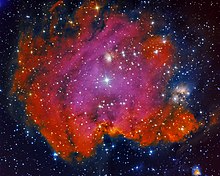NGC 2175
| NGC 2175 | |
|---|---|
 | |
| Observation data (J2000 epoch) | |
| Right ascension | 06h 09m 39s |
| Declination | +20° 29′ 15″ |
| Distance | 6,350 ly |
| Apparent magnitude (V) | 6.8 |
| Apparent dimensions (V) | 18′ |
| Physical characteristics | |
| Other designations | Cr 84 |
| Associations | |
| Constellation | Orion |
Open Cluster NGC 2175 (also known as OCL 476 or Cr 84) is an open cluster in the Orion constellation, embedded in a diffusion nebula. It was discovered by Giovanni Batista Hodierna before 1654 and independently discovered by Karl Christian Bruhns in 1857. NGC 2175 is at a distance of about 6,350 light years away from Earth.
The nebula surrounding it is Sharpless catalog Sh 2-252, and it is sometimes called the Monkey Head Nebula due to its appearance.
There is some equivocation in the use of the identifiers NGC 2174 and NGC 2175. These may apply to the entire nebula, to its brightest knot, or to the star cluster it includes. Burnham's Celestial Handbook lists the entire nebula as 2174/2175 and does not mention the star cluster.[1] The NGC Project (working from the original descriptive notes) assigns NGC 2174 to the prominent knot at J2000 06h 09m 23.7s, +20° 39′ 34″ and NGC 2175 to the entire nebula, and by extension to the star cluster.[2] Simbad uses NGC 2174 for the nebula and NGC 2175 for the star cluster.[3][4]

References
- ^ Robert Burnham, Jr (1978). Burnham's Celestial Handbook. Dover. p. 1280.
- ^ "Public Database". NGC/IC Project. Results for NGC 2174 and NGC 2175. Archived from the original on 28 May 2009. Retrieved 12 January 2014.
- ^ "Results for NGC 2174". SIMBAD Astronomical Database. Retrieved 2011-07-13.
- ^ "Results for NGC 2175". SIMBAD Astronomical Database. Retrieved 2014-01-13.
External links
- NGC 2175 @ SEDS NGC objects pages
- NGC 2175 on WikiSky: DSS2, SDSS, GALEX, IRAS, Hydrogen α, X-Ray, Astrophoto, Sky Map, Articles and images
